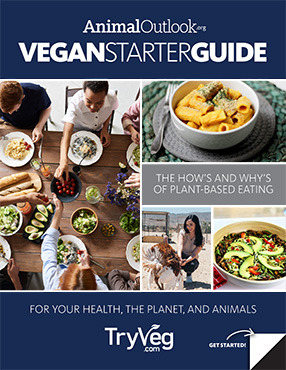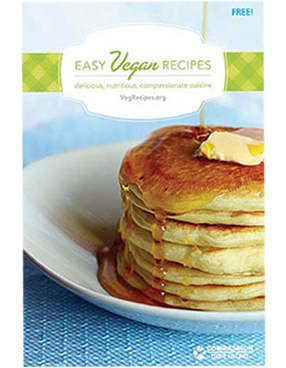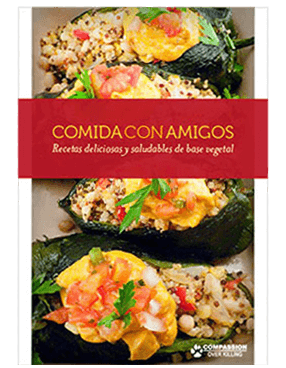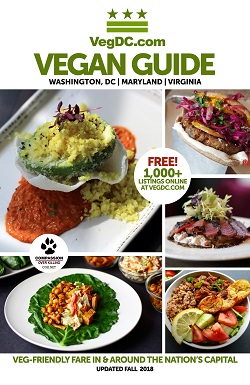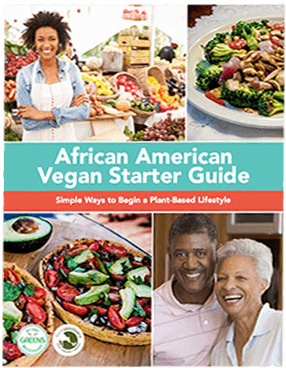Whether you’re hosting a leafleting event or just want a single free copy to help you learn more about vegan eating, TryVeg.com and Animal Outlook have leaflets, brochures, and booklets to help. Click on the images below to learn more. Have a vegan family? Check out the Vegan Family Podcast!
Easy Vegan Substitutes
Need some ideas of what to look for next time you go grocery shopping? Here are some of our favorites — and be sure to check out the “New-To-You-Foods” section below for more grocery shopping tips, and this vegan food substitutes glossary from Vegan Outreach!
For meat-free and convenient hearty dishes, look for brands like Tofurky, Gardein, Beyond Meat, Field Roast, and Boca which are usually found in your grocer’s natural foods or frozen section. For dairy substitutes, we love Daiya, Teese, and Go Veggie! vegan cheese. And for frozen desserts, reach for Purely Decadent, So Delicious, Tofutti, and Coconut Dream flavors of vegan ice cream!
Eating Vegan on a Budget
Discover how easy — and affordable — it is to transition to a more compassionate diet! Here are a few cost-saving tips:
Explore your community’s Community Supported Agriculture programs and farmer’s markets — both can be inexpensive options for finding fresh produce.
The most expensive foods in grocery stores are often displayed at eye-level. Look at the top and bottom shelves for better bargains.
The more meals you can prepare at home, the better. Fast food is not cheap — and it comes at a higher cost to your health. While it might be challenging to cook meals during the work week, preparing items ahead of time on a weekend for the week may help significantly.
Buy bulk pasta, rice, dehydrated meals, spices, and beans. These items are usually cheaper than buying them pre-packaged, and you can get as little or as much as you need.
Baking without Eggs
• If the egg is the main liquid ingredient, it adds moisture.
• If the recipe has one egg but also contains a leavening agent (such as yeast, baking powder, or baking soda), the egg is the binder.
• If there are no other leavening agents, then the egg is the leavener.
Now you can easily find a replacement! Just look at all of these options:
| Substitute: | Moisture | Binding | Leavening |
|---|---|---|---|
| ¼ cup silken tofu | x | x | |
| ¼ cup applesauce, banana, or pureed fruit + ½ tsp baking powder | x | x | |
| 1 tbsp flax meal + 1 tbsp water | x | x | |
| 2 tbsp arrowroot, cornstarch, or potato starch + 1 tbsp water | x | x | |
| 1 tsp baking powder + 1 tsp vinegar | x | ||
| 1 tsp Ener-G Egg replacer + 2 tbsp water | x | x | |
| ¼ tsp xanthan gum* + ¼ cup water | x | x | x |
| ¼ tsp agar powder** + ¼ cup water + 1 tsp baking powder | x | x | x |
** Agar powder: Agar is a red algae and a unique vegetable source of protein. Agar is sometimes referred to as Agar-Agar. It has no taste, no odor, and no color.
Meal and Snack Ideas
Breakfast: cereal with almond or soy milk, oatmeal with cinnamon and maple syrup, a fruit smoothie, tofu scramble, toast with peanut butter, soy yogurt with raisins
Lunch: a veggie burger, falafel wrap with hummus, a sandwich with veggie meat deli slices, rice and beans, vegetable chili, a salad, peanut butter and jelly sandwich
Dinner: vegetable stir fry over rice, spaghetti with marinara sauce, vegetable stew, BBQ tofu, a black bean burrito, vegetable lasagna with ground veggie beef
Snacks: fresh fruit. mixed nuts, energy bar, green smoothie, baked pita wedges with hummus, chips with salsa, popcorn
Need a jumpstart in the kitchen? Check out our free easy vegan recipes.
New-to-you Foods
So to help guide you as you explore various recipes calling for foods you may have never heard of, here’s a quick list:
Tofu: Made from soybeans, tofu is high in protein and calcium, and it readily absorbs surrounding flavors and spices. It typically comes in a white block and is available in many textures that can be fried, sautéed, steamed or scrambled.
Tempeh: With a firmer texture than tofu, tempeh is also a soy product. It has a nutty mushroom flavor and can take the place of meat in a recipe.
Nutritional Yeast: Packed with vitamins and minerals, this flaky, inactive yeast product has a cheesy flavor that is great for soups, pasta, macaroni and cheese, and more.
Seitan: Also called “gluten,” seitan (pronounced SAY-tan) is a protein-packed wheat-based meat alternative. It can be found pre-packaged in grocery stores with or without added flavors, and you can also make your own.
Miso: A salty seasoning produced by fermenting rice, barley or soybeans, miso is a thick paste that can be used in spreads and sauces or diluted for a delicious soup base.
Soy, Almond, Rice, Flax, Hemp, Coconut Milks: These are alternatives to dairy milk with usable calcium and healthier protein. They are also free of cholesterol.

